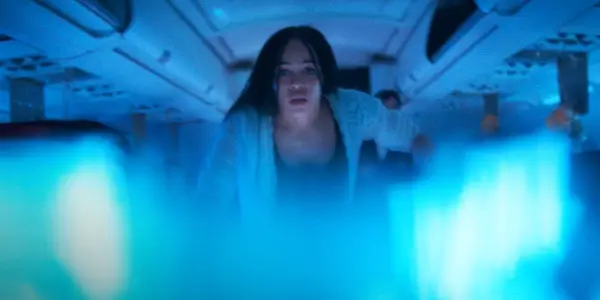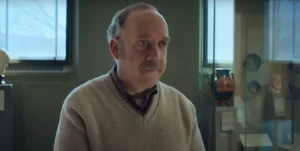
Disaster films involving unlikely animal attacks continually attempts to garner our attention. And while some fall flat, others become surprising sensations with an undeniable following. Jurassic Park, Deep Blue Sea, Sharknado, Crawl, Jaws, The Meg, Lake Placid and Snakes on a Plane each were meet with their own success, each more ridiculous than the other but far from forgettable. For many of these films, it is their ability to lean into the absurd, a clear awareness of how far the film is from reality working to its advantage. Additionally, its the ability of these films to wield the power of the one liner, effectively heightening the moments they are found within and living on in infamy.
Promoted as “sharks on a plane”, Claudio Fäh‘s No Way Up immediately had my attention, the absurdity of sharks on a plane and how this would all play out piquing my intrigue. And while it does have its moments of tension, No Way Up proves it is sunk with no hope of rescue.
Crash and Burn
No Way Up immediately leans into the tropes of an animal disaster film, the first third of the film utilized to introduce its menagerie of characters and initial conflict. As the opening score begins to welcome us into the destruction, its notes fell reminiscent of Deep Blue Sea, giving a sense of homage early on in the film. As No Way Up plays through its opening sequence, it is a collage of picturesque ocean clips, shot from above and below. There is little fear that lives within its waves, both the power and majesty of the ocean captured before our eyes. It is not until the film settles on a. woman falling into the water that it begins to embrace the dark undertones of its beginning. As the woman sinks, the camera moves in closer, taking in the tranquility of her face, viewers convinced that she has died. Yet, as she opens her eyes and screams, a man shoots up in bed – the entire moment nothing more than a nightmare.
source: RLJE Films
While No Way Up works to create a premeditated motivation for its characters, it never truly embraces the effectiveness of this opening, leaving it strictly as a call back for a character’s move towards or lack of action. Where it effectively creates tension, it is lost in the slow burn of character introductions and underutilization.
As we move to the airport and the plane, the body count and potential survivors are slowly introduced. One by one we meet the governor’s daughter Ava (Sophie McIntosh) and her friends Jed (Jeremias Amoore) and Kyle (Will Attenborough), grandparents Mary (Phyllis Logan) and Hank (James Carroll Jordan) bringing their granddaughter Rosa (Gray Nettle) to their timeshare, flight attendant Danilo (Manuel Pacific) and Ava’s bodyguard Brandon (Colm Meaney). As the film works through each character, it feels as though No Way Up is trying too hard to lean into the classic tropes of a disaster, giving the film a heavy weight of predictability. As the plane takes off, it is set with disaster, and the initial conflict is presented like a scene from Final Destination before plunging into the ocean below. As the survivors take stock of their situation, they find surviving the crash was only the beginning.
source: RJLE Films
Disaster films work by being ridiculous, honing in on a sense of predictability while throwing reality out the window. For No Way Up, it becomes too ridiculous. And while viewers of disaster movies do not expect perfection, details at times are too obvious at the lackluster sense of attention the film was given – one particularly favorite moment capturing a wet hat thrown to one of the survivors, the one they catch dry as a bone. The film pushes its challenge of reality, many times leaving viewers detached from the viewing experience as they question how that could even happen. While this is expected in a film of this nature, too often it becomes too distracting
Conclusion:
No Way Up still retains the entertainment factor, no matter its predictability and overarching absurdity. While I sometimes found myself disengaging from the film, No Way Up always brought me back in. It works well at building visual constructions of the danger, the plane’s destruction and crash working as one of the film’s finer moments. As No Way Up works through its shark attack, the film works well to create a reminiscent feel of the story of the Indianapolis, survivors left behind and eaten one by one by sharks after their ship sank – a quiet homage here as the story of the Indianapolis is a standout moment in Jaws.
Yet, it does not seem to want to cross the finish line as strongly as it aims to, with too much predictability and impossibility, leaving the final moments feeling lackluster, No Way Up puttering to the end.
No Way Up was released in theaters and on VOD on February 16, 2024!
Does content like this matter to you?
Become a Member and support film journalism. Unlock access to all of Film Inquiry`s great articles. Join a community of like-minded readers who are passionate about cinema – get access to our private members Network, give back to independent filmmakers, and more.









